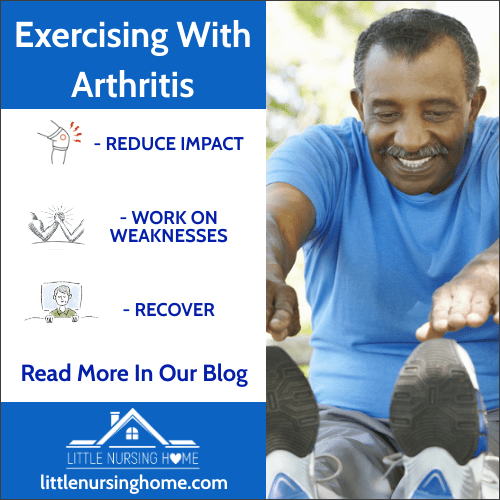Physical activity is key for seniors who want to reduce the long-term arthritic pain in their joints. At first, it can feel impossible, but those who choose to try to find exercise to be one of the best ways to manage arthritis pain. “No pain, no gain” is especially true for those who have been diagnosed with Arthritis.
Neil Roth, M.D., an orthopedic surgeon, and sports medicine specialist at the New York Sports Medicine Institute says “arthritis pain can prevent a person from exercising, but it is one of the best ways to alleviate arthritis pain”. So, taking the doctor’s advice we present you with five ways to make exercise more arthritis-friendly:
1. Concentrate on managing the pain
Making sure pain is under control before working out and involve anti-inflammatory medications or therapies, so a trip to the doctor should be the number one task on the list. Remember, doctors can also suggest specific exercises to benefit you most and advise you what kind of activities can be most harmful. Once the pain is under control, starting slow is best, to prevent injuries from happening. Some warm-up exercises for seniors can include movements like arm circles, hip lifts, and toe touches. Dr. Roth says heating packs on the most painful areas can help the muscles and joints loosen up.
2. Reduce Your Impact
Some of the best cardiovascular training with low-impact exercises for arthritis sufferers are swimming, water aerobics, elliptical machines, and stationary cycling. Mixing it up with other activities like yoga perhaps can help seniors improve their balance and flexibility. Improvement in depression symptoms and quality of life is an added benefit. Weight training is a safe option with low impact, but consult with a trainer before grabbing the dumbbells and check with a doctor before beginning the weight training program.
3. No Pain Can be Gains
Try to avoid exercises that can cause pain, the old saying “no pain, no gain” doesn’t always apply to those who have arthritis. Naturally, in the beginning, most elders will feel some pain when exercising, however, it should not happen forever. Remember that pain is also a way for your body to tell you that you may be doing something wrong. Some ways to avoid pain or injuries are to warm up and stretch before the workout. If you are feeling pain and there is inflammation, stop and consult with a doctor.
4. Train on the Weaknesses
Sticking to a routine may not always be the best way to exercise. When it comes to strength training such as weightlifting focusing on the weak muscles may be more efficient. Some of the most beneficial exercises are those that strengthen the muscles to support those weak joints. Safety is a priority when working out with weights of any size; the last thing you need is an injury caused by incorrect form or inappropriate weight. Start super light!
5. Recovery and Diet
In the same way, managing pain before working out is important, recovering is also crucial before and after. For a smooth recovery process, icing after exercising for about 20 minutes is recommended. Eating right is also crucial for a good recovery and to prevent pain. Having a diet with plenty of lean protein helps muscle growth, and for those who do a lot of cardio, carbohydrates are great to help recovery. To treat inflammation, certain types of food help to prevent muscle swelling, like lettuce and other greens.
If you’d like to learn more, or are considering a nursing home or assisted living for a loved one in northern NJ, The Little Nursing Home of Montclair offers a cozy and calm atmosphere with the comforts of home. Call or email us for more info to schedule a tour.

